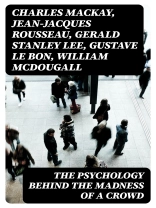In ‘The Psychology Behind the Madness of a Crowd, ‘ readers are introduced to a compendium of influential reflections on the behavioral phenomena that define collective human behavior. This anthology traverses the rich terrain of crowd psychology, drawing from a diverse array of literary styles and historical perspectives. The included works, spanning essays to philosophical treatises, probe the intricate dynamics of societal and psychological undercurrents that characterize human congregations. The collection achieves a dynamic tapestry of thought, illuminating how groups often transcend individual rationality, resulting in behavior as captivating as it is sometimes perilous. The authors within this anthology are seminal voices who have shaped our understanding of collective psychology. With contributions from luminaries such as Charles Mackay, Gustave Le Bon, and Wilfred Trotter, the collection draws from thinkers associated with various historical and cultural movements, from the Enlightenment to early 20th-century psychology. These minds converge to dissect the elemental forces at play in group dynamics, offering nuanced insights into the moral and societal implications of mob behavior. Through their essays and theories, they invite readers to explore the psychological mechanisms that transform rational individuals into powerful, and occasionally irrational, collective entities. This anthology is an essential acquisition for anyone keen to unravel the complexities of crowd behavior, offering a rare opportunity to engage with a multitude of perspectives and analytical styles within a unified theme. It is an invaluable resource for scholars, students, and lay readers alike, seeking to understand the socio-psychological fabric of crowd phenomena and its impact throughout history. By immersing oneself in this compilation, readers will be propelled into a dialogue that is as enlightening as it is thought-provoking, expanding their comprehension of how individual psychology is reshaped in the crucible of the crowd.
About the author
Charles Mackay (1814–1889) was a Scottish poet, journalist, author, and anthologist. He is most memorably noted for his seminal work ‘Extraordinary Popular Delusions and the Madness of Crowds, ‘ first published in 1841, where Mackay analyzes the crowd psychology behind economic bubbles, alchemy, crusades, witch hunts, prophecies, and other social phenomena. Although the book referenced, ‘The Psychology Behind the Madness of a Crowd, ‘ seems to be a misphrased title likely derivative of his aforementioned classic work. His investigations into the manipulative forces of group behavior and the susceptibility of the masses to suggestion were pioneering and remain influential in both economic and psychological studies. Known for his scholarly style, Mackay’s prose seamlessly wove historical analysis with a narrative that revealed the universality of human folly. His observations have endured the test of time, proving prescient in the understanding of market psychology and collective behavior. This legacy keeps his work alive, particularly resonant within financial sectors and among sociologists who explore the dynamics of societal behavior. Beyond ‘Extraordinary Popular Delusions and the Madness of Crowds, ‘ Mackay’s oeuvre includes various volumes of poetry and songs, such as ‘Voices from the Mountains’ (1846) and ‘The Lump of Gold’ (1848), demonstrating his versatile engagement with Victorian literary culture.












